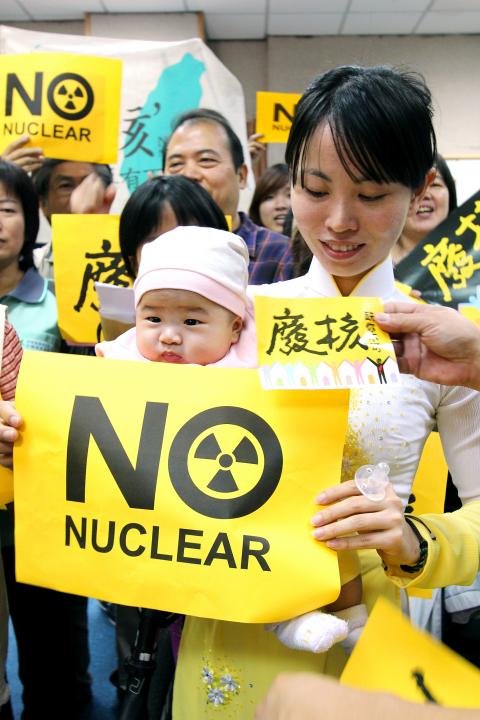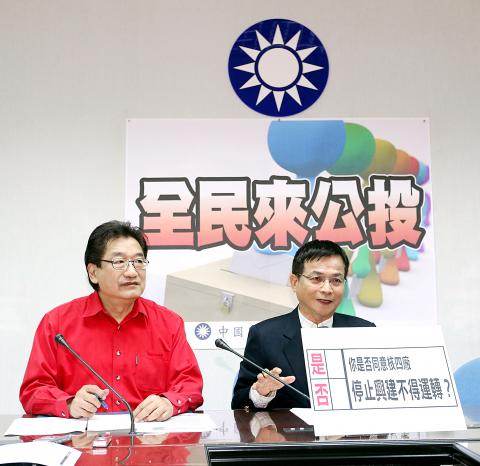The Chinese Nationalist Party (KMT) yesterday unveiled its proposal for a referendum on the construction of the nearly complete Fourth Nuclear Power Plant in New Taipei City’s (新北市) Gongliao District (貢寮), and suggested postponing the vote from August, as originally scheduled, to December to allow for the implementation of absentee voting.
The wording in the proposal would ask the public: “Do you agree that the construction of the Fourth Nuclear Power Plant should be halted and that it not become operational?” (你是否同意核四廠停止興建不得運轉)
The proposal will be submitted to the legislature for approval under the name of KMT Legislator Lee Ching-hua (李慶華) and other lawmakers, not the KMT caucus.

Photo: Wu Ming-chung, Taipei Times
Lee needed to collect signatures from at least 19 other lawmakers to meet the threshold required to submit the proposal to the legislature.
The proposal lists five reasons for halting the construction and banning the operation of the power plant, as well as five counterarguments.
The reasons listed against running the Fourth Nuclear Power Plant were: First, operating a nuclear plant is not the safest way to generate energy and carries the risk of causing irreparable consequences.

Photo: CNA
Second, nuclear power is not the cheapest source of energy, considering the cost of disposing of nuclear waste, decommissioning a plant and cleaning up the construction site.
Third, there are many safety issues have been discovered at the Fourth Nuclear Power Plant during its construction, which are compounded by the fact that Taiwan Power Co (Taipower, 台電) is not experienced in integrating components for the plant made by different companies, concerns that the operator has withheld information about safety violations and a general lack of confidence in the government’s regulatory mechanisms.
Fourth, Taiwan is frequently hit by earthquakes and typhoons and the power plant is in a vast metropolitan area. If there was a threat of a radiation leak, the government does not have the capability to evacuate the entire area that would be at risk.
Fifth, after the accident at the Fukushima Dai-ichi nuclear power plant in 2011, Japan temporarily shut down all its nuclear power plants and some other countries starting working toward becoming nuclear-free. Taiwan can also adopt such a policy and develop alternative sources of energy.
The five reasons listed in the proposal in favor of finishing the construction of the power plant and making it operational were:
First, generating nuclear power is a relatively clean process in terms of carbon dioxide emissions and helps cut the nation’s greenhouse gas emissions so it can honor the environmental pledges it has made.
Second, a nuclear-free homeland cannot be achieved in one step. Nuclear power plants are a key element in the nation’s gradual progress toward that goal, as they provide a stable supply of energy that can allow people to change their lifestyles and the government to adjust the industrial structure to set the nation on a path toward becoming nuclear-free and having a near-zero-emission economy.
Third, terminating the construction of the power plant could lead to power shortages because all renewable energy technologies, such as natural gas, are still undeveloped, extremely expensive and vulnerable to fluctuations in the prices of raw materials in the global market.
Fourth, halting the plant’s construction could send prices of electricity soaring, severely impacting the economy and people’s livelihoods, resulting in a decline in GDP, driving industries overseas and raising unemployment.
Fifth, if the Fourth Nuclear Power Plant cannot be put into operation, it might be necessary to extend operating licenses of the nation’s three operational nuclear plants, which could carry serious risks because of the three plants’ aging reactors.
The fourth and fifth reasons are exemplified by Japan, which recorded a trade deficit of ¥2 trillion (US$21.1 billion) in 2011 mainly because of the large amount of natural gas it had to import to meet power shortages caused by having all 54 of its nuclear reactors out of service.
Its trade deficit nearly tripled to a record ¥6.9 trillion last year due to high fuel import costs, forcing Japanese Prime Minister Shinzo Abe to revise the zero-nuclear policy decided by the previous administration in response to the Fukushima Dai-ichi nuclear incident.
The KMT’s proposal came after President Ma Ying-jeou (馬英九), Premier Jiang Yi-huah (江宜樺) and KMT party leaders decided late last month to place the issue of the Fourth Nuclear Power Plant to a referendum in August to settle the decades-long controversy over its construction.
If the proposal passes the legislature, the Referendum Act (公民投票法) stipulates that the referendum would have to be held no sooner than one month and no later than six months after gaining legislative approval.
KMT legislative caucus whip Lai Shyh-bao (賴士葆) said that the referendum could be held in December to allow enough time for the inclusion of absentee votes.
Absentee ballots are not currently sanctioned by the legal system and the Ministry of the Interior has said it would need five to six months to prepare the materials needed to carry out absentee voting after related legislation is revised or enacted.
Some KMT lawmakers objected to the proposed question.
KMT Legislator Ting Shou-chung (丁守中) said the part asking if the public agrees that the plant “should not be operated” should be removed because it could preclude the chance of the facility being used for other purposes, for example, gas generation.
Asking if the power plant should not be operated could give the impression that the NT$230 billion (US$7.76 billion) that has already been poured into the Fourth Nuclear Power Plant has been a waste, Ting said.
Ting, a vocal opponent of the power plant, said the proposal also failed to explain in detail the various faults in the design and construction of the power plant that have been identified and which have caused widespread public concern.
KMT Legislator Lo Shu-lei (羅淑蕾) expressed similar views, adding that the proposal did not clearly state when the construction should stop.
Ting reiterated his call for the legislature to establish an ad hoc committee composed of lawmakers across party lines to initiate a joint proposal.
Lo said she is also considering putting forward her own version of the proposal.
Responding to Ting’s concerns, Lai said the question of whether the plant should be operated had been added to the proposal to prevent another referendum calling for the project to be abandoned if the referendum to halt construction fails to pass.
The KMT headquarters said it was happy with the party caucus’ referendum question.
KMT spokesman Yin Wei (殷瑋) said the party expects the referendum process to promote rational dialogue between different groups on the issue.
Separately yesterday, Taipei Mayor Hau Lung-bin (郝龍斌) suggested that the government should invite international nuclear experts, such as the International Atomic Energy Agency, to evaluate the safety of the power plant and make the results of the evaluation accessible to the public so they can be credibly informed about the issue from an independent source.
“I don’t think that information from Taipower alone is convincing. A safety evaluation from international experts would greatly help people make an informed decision on the matter,” Hau said.
Regarding a proposal made by civic groups that instead of a nationwide vote, it should be residents in New Taipei City, Taipei and Keelung that live close to the plant that make the decision, Hau said that the referendum should be a national one because it was about more than just the Fourth Nuclear Power Plant, it was about the views of all Taiwanese on nuclear energy.
Additional reporting by Mo Yan-chih

DAREDEVIL: Honnold said it had always been a dream of his to climb Taipei 101, while a Netflix producer said the skyscraper was ‘a real icon of this country’ US climber Alex Honnold yesterday took on Taiwan’s tallest building, becoming the first person to scale Taipei 101 without a rope, harness or safety net. Hundreds of spectators gathered at the base of the 101-story skyscraper to watch Honnold, 40, embark on his daredevil feat, which was also broadcast live on Netflix. Dressed in a red T-shirt and yellow custom-made climbing shoes, Honnold swiftly moved up the southeast face of the glass and steel building. At one point, he stepped onto a platform midway up to wave down at fans and onlookers who were taking photos. People watching from inside

A Vietnamese migrant worker yesterday won NT$12 million (US$379,627) on a Lunar New Year scratch card in Kaohsiung as part of Taiwan Lottery Co’s (台灣彩券) “NT$12 Million Grand Fortune” (1200萬大吉利) game. The man was the first top-prize winner of the new game launched on Jan. 6 to mark the Lunar New Year. Three Vietnamese migrant workers visited a Taiwan Lottery shop on Xinyue Street in Kaohsiung’s Gangshan District (崗山), a store representative said. The player bought multiple tickets and, after winning nothing, held the final lottery ticket in one hand and rubbed the store’s statue of the Maitreya Buddha’s belly with the other,

‘NATO-PLUS’: ‘Our strategic partners in the Indo-Pacific are facing increasing aggression by the Chinese Communist Party,’ US Representative Rob Wittman said The US House of Representatives on Monday released its version of the Consolidated Appropriations Act, which includes US$1.15 billion to support security cooperation with Taiwan. The omnibus act, covering US$1.2 trillion of spending, allocates US$1 billion for the Taiwan Security Cooperation Initiative, as well as US$150 million for the replacement of defense articles and reimbursement of defense services provided to Taiwan. The fund allocations were based on the US National Defense Authorization Act for fiscal 2026 that was passed by the US Congress last month and authorized up to US$1 billion to the US Defense Security Cooperation Agency in support of the

HIGH-TECH DEAL: Chipmakers that expand in the US would be able to import up to 2.5 times their new capacity with no extra tariffs during an approved construction period Taiwan aims to build a “democratic” high-tech supply chain with the US and form a strategic artificial intelligence (AI) partnership under the new tariffs deal it sealed with Washington last week, Taipei’s top negotiator in the talks said yesterday. US President Donald Trump has pushed Taiwan, a major producer of semiconductors which runs a large trade surplus with the US, to invest more in the US, specifically in chips that power AI. Under the terms of the long-negotiated deal, chipmakers such as Taiwan Semiconductor Manufacturing Co (TSMC, 台積電) that expand US production would incur a lower tariff on semiconductors or related manufacturing